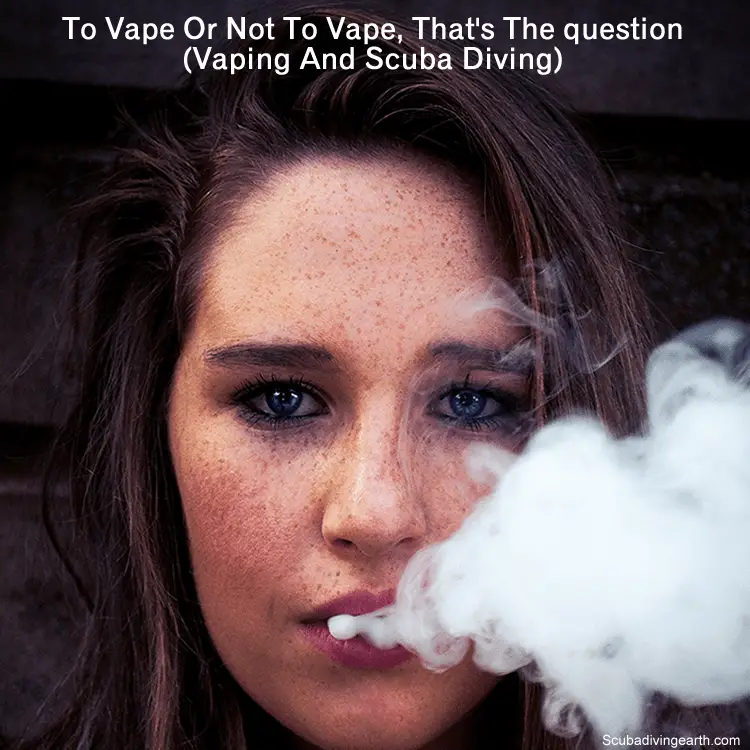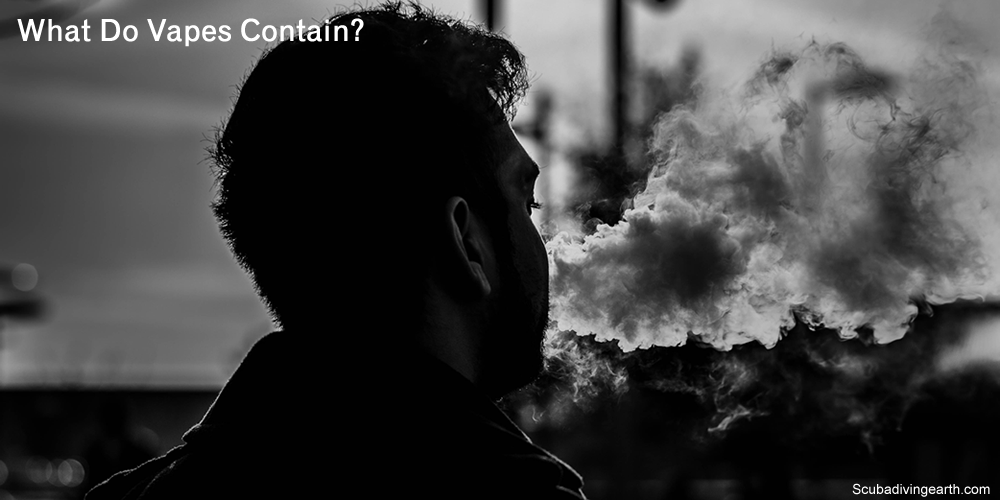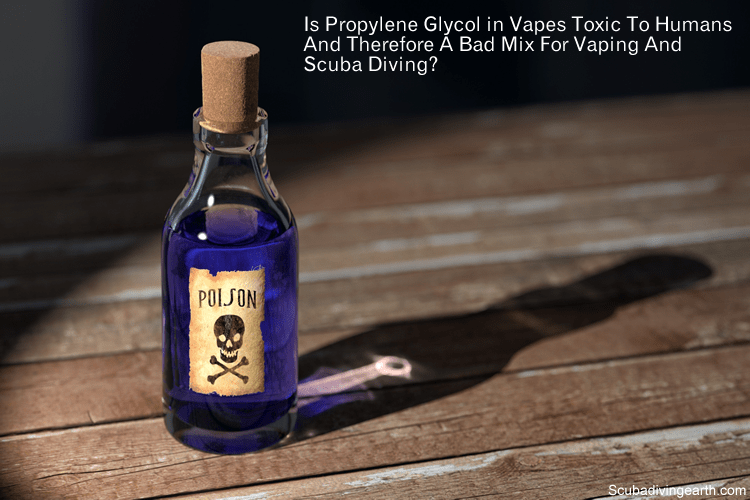
Should scuba divers be using vapes and what harm is there in vaping in-between dives?
Vaping and scuba diving is a concern, and whilst there’s good knowledge and research to suggest that cigarettes and scuba diving are a bad thing (or certainly not a good), the jury is still out on vapes and vaping and scuba diving. Or as some call them Juuling and scuba diving.
Actually, I think the jury’s out all together on whether or not vapes are good or bad for anyone to use, let alone scuba divers using vapes!
There’s no medical research about vaping and scuba diving if it’s good or bad. But considering the main ingredient propylene glycol of e-liquid used in vapes can cause central nervous depression, seizures, laboured deep breathing, coma and suppressed brain activity maybe vaping and scuba diving isn’t good.
The best way to do more diving is to book yourself on a scuba diving liveaboard. You can check the latest and best deals on liveaboards using the following window:

What do vapes contain?
Before I look at vaping and scuba diving, let’s take a look at what vapes contain. What amazes me is just how much vapour is expelled from someone ‘smoking,’ or should I say ‘vaping,’ a vape. It’s worse than the amount of smoke that a smoker expels.
You see more and more people using vapes in the streets and in their cars. But I must admit, I’ve not yet come across a vapist on a dive boat.
What is in a vape?
So what is in a vape? Instead of cigarette smoke, which is what conventional smokers inhale, the user of a vape, vaporiser or vaporizer inhales an aerosol. This is commonly known as a vapor or E-cigarettes. The most commonly smoked vape are a Juul. Which is how vaping has also got its name Juuling.
E-cigarettes typically contain a heating element. This heating element heats a liquid solution. This solution is generally propylene glycol (see below). This liquid solution is known or referred to as an e-liquid.

In addition to containing propylene glycol, E-liquids usually contain, glycerin, water, nicotine, and flavourings. I’m not too sure what effect it has to continually inhale flavourings into your lungs.
This surely can’t be good for you? But it’s not necessarily the flavourings in e-cigarettes that I’m concerned about, it’s the propylene glycol that worries me more.

Is propylene glycol toxic to humans?
It is thought that propylene glycol is a chemical that is “generally recognized as safe.”
However, whilst propylene glycol toxicity is not expected in normal environmental or occupational exposures, scuba diving is not ‘a normal environment’ for humans.
In fact I would say that scuba diving is abnormal. Scuba divers are breathing air at pressure, and the deeper the dive, the higher this pressure.
Propylene glycol is used as an additive for foods and medications, as well as for making up the e-liquid in vaporisers.
It’s written that propylene glycol rarely causes toxic effects to humans, which is in contrast to ethylene glycol, a potent cause of acute toxicity in humans.
Propylene glycol has been known to cause toxic effects in people, but only under very unusual circumstances. Admittedly this does tend to be in infants and newborn babies and the elderly.
But if you add an unusual environment of underwater pressure to the mix, which is what you have in scuba diving, what effect does this have on vaping and scuba diving?

Is propylene glycol safe for scuba divers or is it an added decompression sickness risk-factor?
Does this mean that it’s safe for scuba divers to use vapes? I’m not sure it does. However, reading the article linked-to above about propylene glycol, this is the list of possible physiological effects of this chemical:
- Hyperosmolality
- Lactic acidosis
- Complications of CNS depression
- Seizures
- Coma
- Hypoglycemia, and
- Renal failure
Taking a look at a few of the above physiological effects of propylene glycol or possible outcomes, a few are worth additional comment. But before I do, it’s important to highlight that I’m not a doctor and I’m not a scientist. What I’ve researched here needs to be looked at by scientists and/or doctors for sure.
The reality is only time will tell. But let’s take a look at a few of these physiological affects in more detail:
Vaping and lactic acidosis
Lactic acidosis is a medical condition characterised by the build-up of lactate (especially L-lactate) in the body. This leads to a formation of an excessively low pH in the bloodstream. That can cause nausea, vomiting, Kussmaul breathing, which is laboured and deep breathing (read this page as it surely can’t be good for scuba divers!).
Lactic acidosis can also lead to generalised weakness too.
In summary, I wouldn’t say this description of lactic acidosis would be good for the sport of scuba diving. This is after all classed as a dangerous sport and activity.
Whilst scuba diving is classed as a dangerous sport, the risks that make scuba diving dangerous can be mitigated or reduced. Two of which include quitting smoking and vaping.
Complications of CNS depression
CNS depression is what’s known as central nervous system depression.
This is a physiological state that can result in a decreased rate of breathing, decreased heart rate, and loss of consciousness.
There’s also the possibly of it leading to coma or death. This can result in inhibited or suppressed brain activity.
I wouldn’t describe any of the above physiological states to be good for normal life, let lone for a scuba diving.
What worries me when I read into vaping and scuba diving, it may be okay to combine vaping and scuba diving at shallower depths, but what about a deep dive?
There’s the worry about the impact on things like nitrogen narcosis or the Narcs. But also what about the effect on the build-up of nitrogen. But then decompression on an ascent plus the possible consequence of decompression sickness or the bends.
Hypoglycaemia
Hypoglycemia is a condition caused by a very low level of blood sugar (glucose), which is common in people with with diabetes.
Sugar or glucose is your body’s main energy source. Hypoglycaemia symptoms include things like anxiety, fatigue and an irregular heart rhythm. None of which are particularly conducive to scuba diving.
In essence, and whilst the above physiological effects are not too likely in normal circumstances and in most healthy adults, in my opinion there’s still the possibility of an added risk for scuba divers who use vapes that should be avoided.
Nicotine and scuba diving
What about nicotine and scuba diving? In many vapes, one of the ingredients is nicotine. Vapes that contain nicotine are seen to help smokers quit smoking. But I’m not convinced this is the case.
I think what is happening is that smokers are switching from one bad habit to another unhealthy habit.
Instead of giving up smoking, they are replacing it with vaping. Which is born out in the quote from an article written by Scooby’s Workshop below:
Reinvent how you smoke…This product is intended to replace cigarettes, not help you stop smoking. They want you as a lifetime customer…making cigarettes “safer” by making these e-cigarettes is not going to help, mark my word.
Smokeless cigarettes by Scobby’s Workshop
Whilst about 18 percent of the population in the United States smoke, the percentage in scuba divers is less. However, because of its acute and chronic effects, these may contribute to scuba diving fatalities.
Nicotine effects
Nicotine affects include increases in blood pressure, and heart rate frequency, which is activated by the sympathetic nervous system.
Cigarette smoking results in sympathetic neural arousal, which can last for up to 24 hours.
Another linked effect of smoking and nicotine is the narrowing of blood vessels, which requires the heart to work harder and use more oxygen.
This is not just bad for air consumption whilst scuba diving, but increases the risks associated with scuba diving too. These include the risk of heart attack and stroke.
Divers are encouraged to quit smoking using any possible help they need with due medical supervision. However, use of medicinal nicotine as a convenient replacement or addition to smoking may be unsafe and is not advised. While on a cessation program, divers must be aware of potential adverse effects which may be confused for dive related symptoms. As with all medical interventions, it is wise to abstain from diving for a while to weather out possible adverse events and their interaction with dive safety.
Medicinal Nicotine and Diving, written by Petar Denoble, MD, D.Sc.
Quitting the habit of smoking and vaping so you can enjoy your scuba diving sport in safety
If you’re thinking about quitting your smoking habit for good instead of replacing it with vaping, why not try this quick and easy ‘Quit Smoking Magic.’
Quit Smoking Magic – Discover How to Quit Smoking in as Little as 7 Days, Even if You’ve been a Chain Smoker for the Past 20 Years – with No Relapses, No extra MONEY Needed, and a 98% Success Rate, Guaranteed.
98% Success Rate Program For Smoking Cessation

Vaping and scuba diving
So what’s my conclusion on vaping and scuba diving? I would say that whilst there’s no medical evidence (yet) to say that vaping and scuba diving is a bad combination, there’s also nothing to confirm that it is a good combination either.
On the basis that it can’t be good to fill your body and bloodstream with chemicals when you’re about to dive into a strange and pressurised environment, I would say to avoid vaping at least 24 hours before you scuba dive.
But beter still, in my opinion, would be to give up vaping altogether if you’re a scuba diver.
When scuba diving you don’t only have to think about yourself, but you also need to consider your buddy(s) too. The scuba diving buddy system is about both divers looking out for each other. But if you increase your own scuba diving risk factors, you automatically increase the risks for your buddy too.
Think more carefully about vaping and deep dives
I would also comment and say in my opinion it is particularly important to abstain from vaping if you are doing deeper dives. Or visa versa, if you’re intent on vaping and scuba diving, I’d say you should actually avoid deep dives altogether.
In this instance I would classify a dive as a deep dive if it exceeds 20 metres (66 feet). But especially avoid vaping if you’re intent on doing a decompression stop dive.
Why are you vaping in the first place?
I guess to sum up, it depends on why you are vaping in the first place. Are you a smoker trying to give up smoking and using vaping as your aid to quit your smoking habit?
Do you think vaping is cool and you started with vapes right from the get-go? You may never have been a smoker beforehand.
Or are you a scuba diver that smokes. Perhaps you feel that vaping and scuba diving is a ‘lesser of the two evils?
Whichever it is, I welcome your comments to my thoughts and views on this relatively new subject.
But also I’d like to confirm, that these opinions around vaping and scuba diving are my opinions only. They are not based upon any evidence around scuba diving incidents involving vapes.
More Reading: What should you not do after scuba diving (11 must NOT do’s after diving)
What do you call someone who vapes?
But what do you call someone who vapes? The first word that came to mind as I wrote that last paragraph was a ‘vapist,’ but perhaps someone can correct me on this one.
What makes me smile most about vapists is when I’m following a car when someone is vaping. If they have the car windows open, which I’m sure they have to due to the volume of vapour expelled, the car almost looks like it’s on fire! ‘Smoke’ or vapourised e-liquid pours out from the car windows!
I hope you enjoyed this article about vaping and scuba diving
I’d love to hear from you. I’m hoping this article didn’t come across too much as a lecture or a rant about vaping. Maybe in certain places I’m guilty of this.
I always want my articles to be informative and interesting. But more importantly, my mission is to help make scuba diving a safer sport. But please feel free to comment, however it comes across.
I often learn loads myself in the process of researching articles. I did in this case too. In this case I now understand a bit more about vapes. This idea came about when researching and writing about ‘can you scuba dive if you smoke cigarettes.’
This related also to looking into more detail about decompression sickness risk factors. One of which relates to smoking.
But I would say at this stage, and as vapes are still in their infancy, there’s no telling whether vapes are an added risk factor for scuba divers.
If you’re vaping as a way to escape from cigarettes and to ultimately quit smoking, please consider the ‘Quick Smoking Magic‘ instead.
Tell us about your own scuba diving adventures
Also, please tell us about your adventures of diving and snorkeling, in the comments below. I’d be particularly interest to hear about your stories about scuba diving and vaping or smoking. About you quitting smoking or vaping or whatever else. Please also share your photos. Either from your underwater cameras or videos from your waterproof Gopro’s!
If this article hasn’t answered all of your questions. If you have more questions either about snorkeling or types of scuba diving (or specifically about vaping and scuba diving), please comment below with your questions.
There will also be many more articles about scuba diving (and snorkeling) for you to read and learn about these fabulous sports.
Have fun and be safe!





